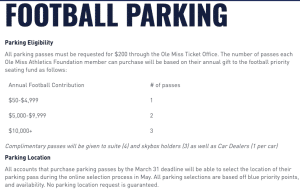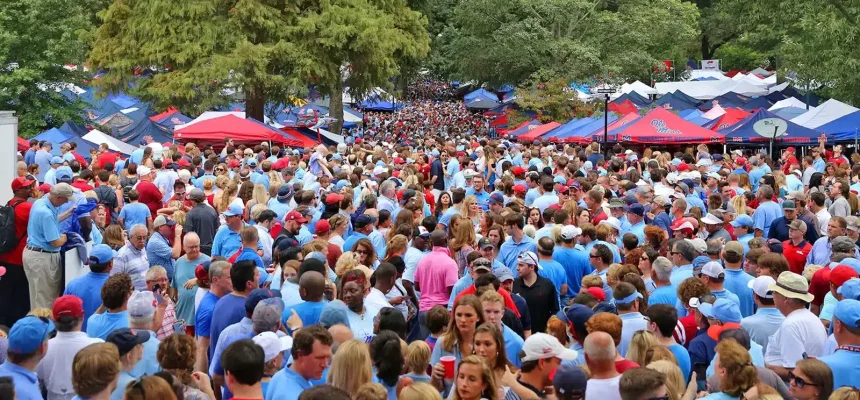Ole Miss is restructuring some of its football game-day operations ahead of an expected landmark ruling allowing revenue sharing to become mainstream across college athletics.
In April, a judge will rule on whether or not to allow the House v. NCAA settlement to come to fruition. The settlement would permit student-athletes to earn a portion of the profits college athletics departments nationwide acquire. Revenue sharing would be optional and the amount of money participating universities could directly pay out to their athletes would be capped at $20.5 million.

Last May, the NCAA Board of Governors, with the blessing of all the power conferences, agreed to settle the antitrust lawsuit. The settlement, if approved, will cost the NCAA roughly $2.78 billion over 10 years.
To make up for the increased costs, Ole Miss will look to strengthen its name, image, and likeness leadership, cut budgets across the athletics department, and review current resources for student-athletes. This is because, according to the university, the Rebels rank No. 13 out of 16 Southeastern Conference programs in total revenue. Ole Miss is also generating nearly $50 million less than the conference average.
While the cost of doing business is elevating, so are the expectations surrounding the product on display — especially on the gridiron. Ole Miss is coming off of back-to-back 10-plus-win seasons for the first time in more than 60 years. The 2024-25 campaign featured multiple home game attendance records being set and an economic impact of $325 million.
Funding a roster rife with blue-chip prospects requires a large sum of money, and when the university has to shell out more than $20 to its student-athletes, the equation becomes complicated.
“Ole Miss Athletics is in the midst of one of the most successful periods in our university’s history, and it is imperative that we make sound economic decisions in order to continue our momentum. The financial commitment to student-athletes is growing dramatically, and we are thinking strategically within our budget to help address these new expenses,” Athletics Director Keith Carter said.
“Ultimately, in order to maintain the level of talent that our teams have achieved, we must increase our department’s revenue. Our staff is working tirelessly to explore new and exciting opportunities, including concerts, premium seating, and other exclusive experiences. On game days, our goal is to minimize the financial impact on the Ole Miss family as much as possible, but there will be new expenses that we want to make fans aware of entering the fall.”
In order to drive revenue, Ole Miss will make changes in the following avenues at the beginning of the upcoming football season:
Tailgating
Though speculation arose that Ole Miss was going to impose a hefty price tag on usage of the Grove, one of the country’s top tailgating spots, rumors were squashed in a release from the university on Friday.
The process by which fans can secure a tailgate setup from their preferred tent vendor will remain. However, a vendor’s fee of $150 per 10×10 tent set up for a single game or $100 per game for the full season. Ole Miss will play eight home games this coming season.
Fans also have the option to set up their tents on their own in the Grove, Circle, and other on-campus tailgating zones free of charge.
All tailgate setups will begin on Fridays ahead of game day. Registered student organizations will continue to access the Grove in advance of the land grab with no cost attached.
Tickets
For the 2025 football season, per-game ticket prices will remain the same as last year. However, with Ole Miss playing an unprecedented eight games in Vaught-Hemingway Stadium, season ticket prices will be upped by $25 to account for the additional matchup.
Fans can renew their season tickets here. Required seat donation figures can be reviewed in the graphic below.

Parking
One of the greatest upcoming changes will occur in parking. Annual donations to the athletics department are mandatory for each parking permit. Annual donations must be renewed each year in order for fans to retain their permits.
Parking locations selected this season will be locked in for the next five years and will be re-selected every five years. Fans will have the opportunity to relocate or upgrade their permit location each year.

Parking donations are 90% tax deductible, and members are rewarded by the university’s ranking system for every $100 given for parking.
“This is an unprecedented time in our industry, and every athletics department in the country is implementing changes such as these in order to stay competitive. We understand the challenges it creates for our fans, and they are not decisions that we enter into lightly,” Carter added.
“With these new revenue opportunities and our department’s cost-cutting measures, our staff is working hard to find the right balance of maintaining the same bucket-list experience while navigating this new world of college sports. Please be patient as we work through these processes, and as our plans continue to evolve, we will provide more information about gamedays in the months ahead.”
Ole Miss will begin the 2025 campaign versus Georgia State at home on August 30. The team’s full schedule can be found here.







